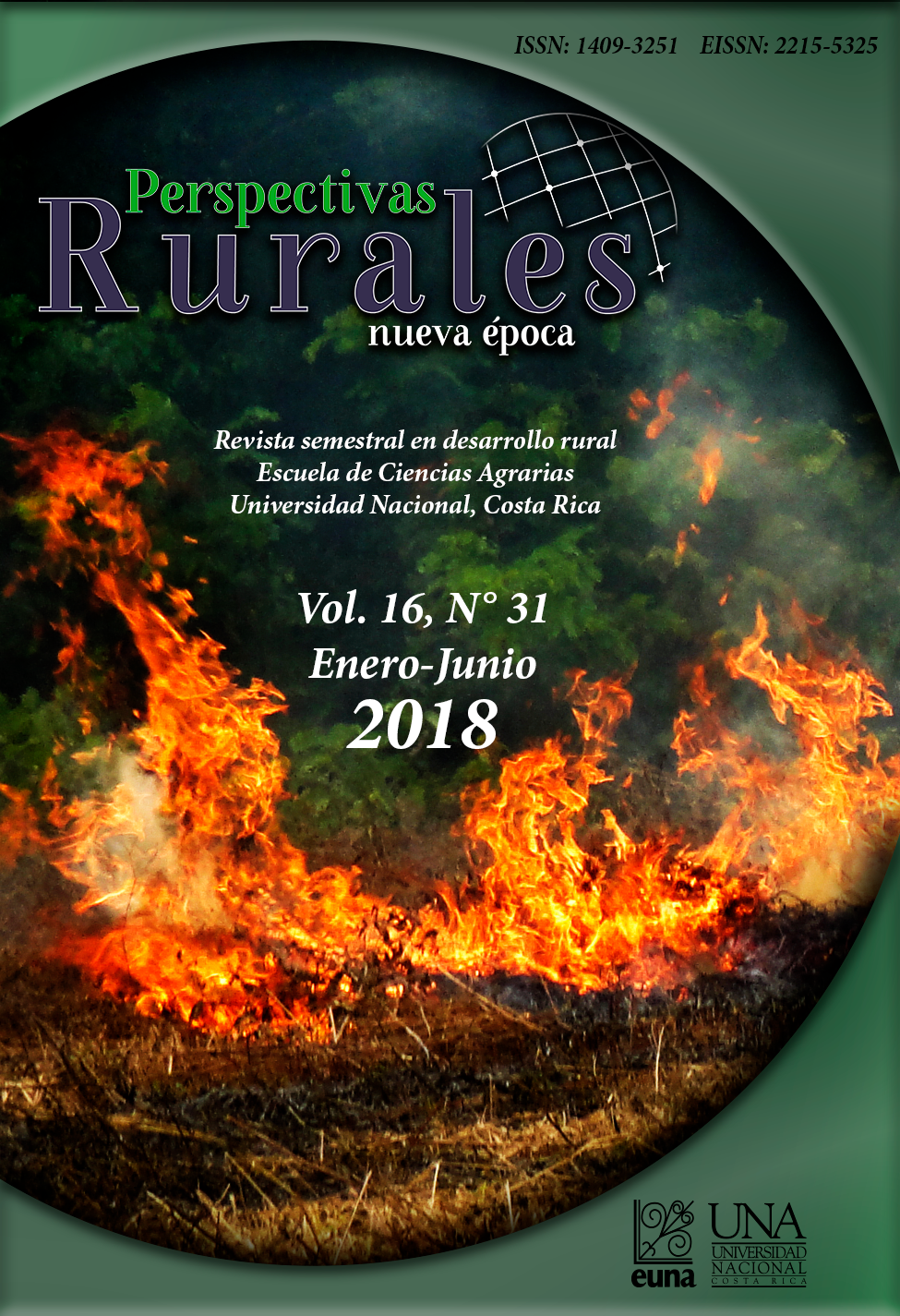Disciplinamiento de las subjetividades como estrategia de prevención de incendios: El caso de las plantaciones forestales en el sur de Chile
DOI:
https://doi.org/10.15359/prne.16-31.7Keywords:
political ecology, extractivism, fires, discipline, emotionsAbstract
The establishment of the Chilean forestry model based on monocultures of fast-growing species was possible not only thanks to the concentration of land and public-private investments to establish an extractive industry aimed towards export, but also through a shift in fire use in the territory. This article reviews the historical role of fire in the establishment of forestry extractivism in southern Chile. Foucault’s notion of discipline is useful in explaining how the exclusion of the use of fire was and is discursively supported, by means of the dissemination of environmental messages to local populations, while state and private capital favor the expansion of tree plantations with severe socio-environmental impacts for local communities. In this article I show how fire prevention campaigns seek to establish and subjective and emotional discipline that guarantees the accumulation of capital associated with forest extractivism.
References
Agrawal, A. (2005). Environmentality: Technologies of Government and the Making of Subjects. Durham: Duke University Press.
ACNUDH. (2014). Informe del relator especial sobre la promoción y protección de los derechos humanos y las libertades fundamentales en la lucha contra el terrorismo, Ben Emmerson. Naciones Unidas, Consejo de Derechos Humanos. Recuperado de http://acnudh.org/wp-content/uploads/2014/05/A-HRC-25-59-add.2-s.pdf
Andreucci, D., and Kallis, G. (2017). Governmentality, Development and the Violence of Natural Resource Extraction in Peru. Ecological Economics 134, 95-103.
Arribas-Ayllon, M. and Walkerdine, V. (2008). Foucauldian Discourse Analysis. In N.K Denzin and Y.S. Lincoln (Eds.), The Sage handbook of Qualitative Research in Psychology (pp 91-108). London: Sage.
Bloomfield, M. J. (2012). Is Forest Certification a Hegemonic Force? The FSC and its Challengers. The Journal of Environment & Development, 21(4), 391–413.
Bridge, G., McManus, P. (2000). Sticks and Stones: Environmental Narratives and Discursive Regulation in the Forestry and Mining Sectors. Antipode, 32(1), 10-47.
Budds, J. (2013). Water, power, and the production of neoliberalism in Chile, 1973-2005. Environment and Planning D: Society and Space, 31(2), 301–318.
Bull, G.Q., Bazett, M., Schwab, O., Nilsson, S., White, A., Maginnis, S. (2006). Industrial forest plantation subsidies: Impacts and implications. Forest Policy and Economics, 9(1), 13–31.
Camus, P. (2006). Ambiente, bosques y gestión forestal en Chile. 1541-2005. Santiago de Chile: Dirección de Bibliotecas, Archivos y Museos, Lom Ediciones.
Carrere, R., Lohmann, L. (1996). Pulping the South: Industrial Tree Plantations and the World Paper Economy. London and New Jersey: Zed Books.
Clapp, R. A. (1995). Creating Competitive Advantage: Forest Policy as Industrial Policy in Chile. Economic Geography, 71(3), 273–296.
Clapp, R. A. (1998). Regions of Refuge and the Agrarian Question: Peasant Agriculture and Plantation Forestry in Chilean Araucania, World Development 26(4), 571–589.
CONAF. (2011). Catastro de los recursos vegetacionales nativos de Chile. Monitoreo de cambios y actualizaciones. Periodo 1997 – 2011. Santiago de Chile: Autor.
CONAF. (2013). CONAF: Su historia y rol en el desarrollo forestal y ambiental de Chile. 1972-2013.
CONAF. (2017). Estadísticas forestales 2003–2016. Recuperado de http://www.conaf.cl/incendiosforestales/incendios-forestales-en-chile/estadisticas-historicas/ (último acceso 30.07.2017).
Cossalter, C., Pye-Smith, C. (2003). Fast-Wood Forestry Myths and Realities. Indonesia: CIFOR.
De la Barrera, F. y Ruiz, V. (2017). Evaluación del impacto de los incendios de Chile Centro-Sur en el verano del año 2017. Primera entrega. IALE-Chile.
Du Monceau, M. I. (2008). The political ecology of indigenous movements and tree plantations in Chile. The role of political strategies of Mapuche communities in shaping their social and natural livelihoods. PhD dissertation. University of British Columbia.
Eriksen, C. (2007). Why do they burn the?bush?? Fire, rural livelihoods, and conservation in Zambia. The Geographical Journal, 173(3), 242–256. doi:10.1111/j.1475-4959.2007.00239.x
Foucault, M. (1990). Vigilar y castigar: Nacimiento de la prisión. Buenos Aires: Siglo XXI editors Argentina.
Gerber, J.-F., Veuthey, S. (2010). Plantations, Resistance and the Greening of the Agrarian Question in Coastal Ecuador. Journal of Agrarian Change, 10(4), 455–481.
Gerber, J.-F. (2011). Conflicts over industrial tree plantations in the South: Who, how and why? Global Environmental Change, 21(1), 165–176.
GHD. (2011). Report for Climate Change Amplified Plantation Fire Risk Study. Department of Agriculture, Fisheries and Forestry.
González-Hidalgo, M., Otero Armengol, I., Kallis, G. (2013). Más allá del humo. La ecología política de los incendios forestales a partir del caso de Horta de Sant Joan (Tarragona, Cataluña). Documents d’Anàlisi Geogràfica.
González-Hidalgo, M. (2015). ¿Agua para quién? Escasez hídrica y plantaciones forestales en la provincia de Arauco. Iniciativa “Agua que has de beber” y ONG Forestales por el Bosque Nativo, Chile.
González-Hidalgo, M., Zografos, C. (2017). How sovereignty claims and “negative” emotions influence the process of subject-making: Evidence from a case of conflict over tree plantations from Southern Chile. Geoforum, 78, 61-73.
Gudynas E. (2013). Extracciones, extractivismos y extrahecciones. Un marco conceptual sobre la apropiacón de recursos naturales. Observatorio del Desarrollo 18. Centro Latino Americano de Ecología Social.
INE. (2007). Censo Agropecuario y Forestal 2007. Resultados por Comuna. Chile: Instituto Nacional de Estadísticas.
INFOR. (2014). Anuario Forestal 2014. Boletín Estadístico N.°144. Instituto Forestal. Santiago de Chile
Klubock, T. (2014). La Frontera: Forests and Ecological Conflict in Chile’s Frontier Territory. Duke University Press.
Kull, C. A. (2002). Madagascar aflame: landscape burning as peasant protest, resistance , or a resource management tool? Political Geography, 21, 927–953.
Lemke, T. (2001). The birth of bio-politics”: Michel Foucault’s lecture at the Collège de France on neo-liberal governmentality. Economy and Society, 30(2), 190–207.
Li, T.M. (2007). The will to Improve: Governmentality, Development, and the Practice of Politics. Duke University Press, Durham, NC.
López, S., Nitrihual, L. (2013). Vidas de papel: Negocio de la madera y conflicto intercultural en Chile. Universidad de la Frontera.
Malhi, A. (2011). Making spaces, making subjects: land, enclosure and Islam in colonial Malaya. Journal of Peasant Studies, 38(4), 727–746.
Mathews, A. S. (2005). Power / Knowledge, Power / Ignorance: Forest Fires and the State in Mexico. Environment, 33(6), 795–820.
Mella, E. (2007). Los mapuche ante la justicia: La criminalización de la protesta indígena en Chile. LOM Ediciones, Observatorio de Derechos de los Pueblos Indígenas and IWGIA.
Ormazábal. (1992). Informe final. Comisión medio ambiente. Resultados y propuestas, Plan de acción forestal para Chile.
Otero, L. (2006). La huella del fuego. Historia de los bosques nativos: Poblamiento y cambios en el paisaje del sur de Chile. Santiago de Chile: Pehuén Editores Limitada.
Peluso, N. L., Lund, C. (2011). New frontiers of land control: Introduction. Journal of Peasant Studies, 38(4), 667–681.
Pinto, J. (2003). La formación del Estado y la nación, y el pueblo mapuche. De la inclusión a la exclusión. Santiago de Chile: Dirección de Bibliotecas, Archivos y Museos.
Pryor, L. (1982). The Plantation Economy as an Economic System. Journal of Comparative Economics 6, 288–317.
Sletto, B. (2008). The Knowledge that Counts: Institutional Identities , Policy Science , and the Conflict Over Fire Management in the Gran Sabana , Venezuela. World Development, 36(10), 1938–1955.
Svampa, M. (2011). extractivismo neodesarrollista, gobiernos y movimientos sociales en América Latina. Revista Problèmes de l’ Amérique Latine, 81, 103-128.
Torres, R., Azócar, G., Rojas, J., Montecinos, A., Paredes, P. (2015). Vulnerability and resistance to neoliberal environmental changes: An assessment of agriculture and forestry in the Biobio region of Chile (1974–2014). Geoforum, 60, 107–122.
Vandergeest, P., Peluso, N. L. (2006). Empires of Forestry: Professional Forestry and State Power in Southeast Asia, Part 2. Environment and History, 12(4), 359–393.
Winkel, G. (2012). Foucault in the forests—A review of the use of “Foucauldian” concepts in forest policy analysis. Forest Policy and Economics, 16, 81–92.
WRM. (2013). Las plantaciones no son bosques. Movimiento Mundial por los Bosques Tropicales.
Downloads
Published
How to Cite
Issue
Section
License
![]()
Revista Perspectivas Rurales. Nueva Época se encuentra bajo una licencia Creative Commons Reconocimiento-NoComercial-CompartirIgual 4.0 Internacional License.
Creado a partir de la obra en http://www.revistas.una.ac.cr/index.php/perspectivasrurales
Los autores/as que publiquen en esta revista aceptan las siguientes condiciones:
- Los autores/as conservan los derechos de autor y ceden a la revista el derecho de la primera publicación, con el trabajo registrado con la Licencia Creative Commons Atribución-NoComercial-CompartirIgual 4.0 Internacional, que permite a terceros utilizar lo publicado siempre que mencionen la autoría del trabajo y a la primera publicación en esta revista.
- Los autores/as pueden realizar otros acuerdos contractuales independientes y adicionales para la distribución no exclusiva de la versión del artículo publicado en esta revista (p. ej., incluirlo en un repositorio institucional o publicarlo en un libro) siempre que indiquen claramente que el trabajo se publicó por primera vez en esta revista.
- Se permite y recomienda a los autores/as a publicar su trabajo en Internet (por ejemplo en páginas institucionales o personales) antes y durante el proceso de revisión y publicación, ya que puede conducir a intercambios productivos y a una mayor y más rápida difusión del trabajo publicado.






